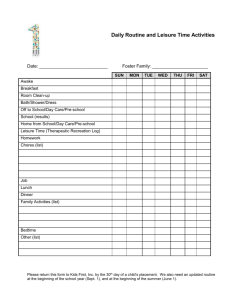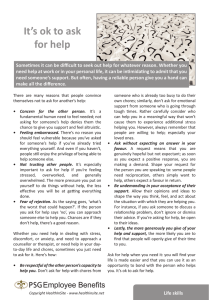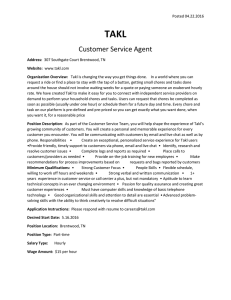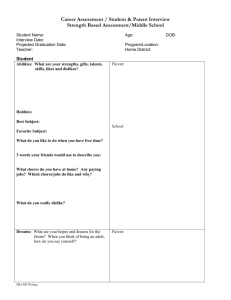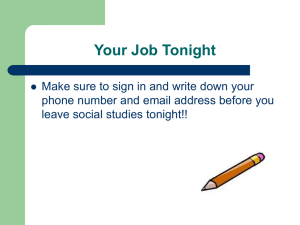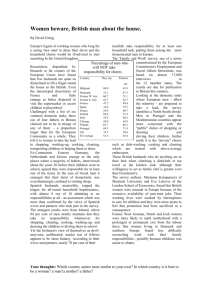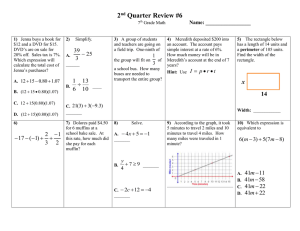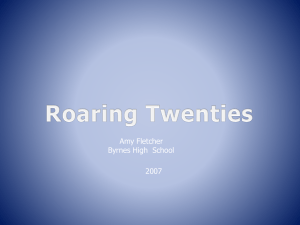Building Responsibility in Your Child
advertisement
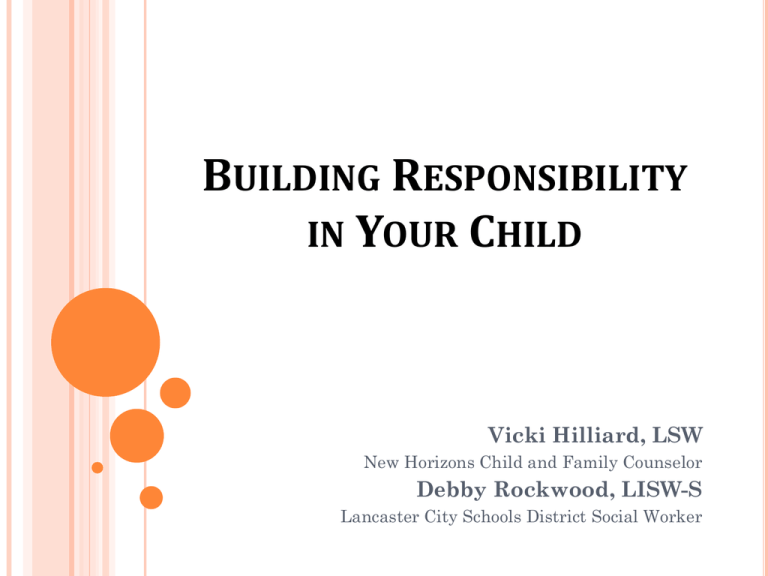
BUILDING RESPONSIBILITY IN YOUR CHILD Vicki Hilliard, LSW New Horizons Child and Family Counselor Debby Rockwood, LISW-S Lancaster City Schools District Social Worker “IF YOU WANT CHILDREN TO KEEP THEIR FEET ON THE GROUND, PUT SOME RESPONSIBILITY ON THEIR SHOULDERS.” -ABIGAIL VAN BUREN WHY TEACH YOUR CHILD TO BE RESPONSIBLE? Teaching your child responsibility is a tool to help them be successful in life. Teaching your child to be responsible means training them to develop self control and healthy problem solving skills. Learning responsibility will allow children to take accountability for their actions, and accept the consequences of their choices. Responsible character is formed over time. RESPONSIBLE PEOPLE ACT THE WAY THEY SHOULD WHETHER OR NOT ANYONE IS WATCHING. STEPS TO HELP YOUR CHILDREN LEARN TO BE RESPONSIBLE: MODEL RESPONSIBLE BEHAVIOR: Children learn from what they see and hear, and we are teaching our children with what we say and what we do. What they witness can have lasting effects. Set a good example by acting in a responsible way. Be the person you want your children to be. Think about your values and how you show these values to your children. Make responsibility a family value. “CHILDREN ARE LIKE WET CEMENT. WHATEVER FALL ON THEM MAKES AN IMPRESSION.” DR. HAIM GINOTT HAVE THEM HELP OUT WITH CHORES Children as young as 2 can learn to help out with chores. It may take them longer, but they will learn that they can do things to be helpful. Do the chores along with them. Have a positive attitude about getting these chores done. Turn it into a game; set the timer and see if they can beat the clock. When they are old enough, have a list of chores they are responsible to complete each week, or let them pick which chores they would like to do. Give allowance and let them learn how to be responsible with their own money. USE ROUTINE CHARTS Have your child help you create a routine chart. When they are involved in making the chart, they will be more motivated to follow through with it. Focus on areas that your child struggles with or has trouble remembering to do, such as: Morning routines Bedtime routine Homework completion Use can also use charts to reinforce and encourage a desirable behavior (sleeping in their own bed, cleaning their room, turning in homework, …) ESTABLISH AGREEMENTS, CONSEQUENCES, AND REWARDS IN ADVANCE When developing a routine or reward chart with your child, have them help you come up with the rewards and consequences. You and your child should decide together on a realistic reward for completing their chart. It should be something your child is motivated to work towards. Give encouragement and praise along the way. If your child is not following through with their chart, you can kindly ask them, “What was our agreement about getting your homework done?” This puts the responsibility back on them. You are helping them to make the right choices. If they choose not to follow through with the agreement, they must accept the consequences. Establish what these consequences will be in advance. Be firm and consistent when following through with consequences. USE NATURAL CONSEQUENCES WHEN THEY MAKE MISTAKES Teaching responsibility means teaching your child to make good choices. When good choices are made, they will experience the positive consequences of that. When poor choices are made, they will experience and have to accept the negative consequences. Sometimes the consequence does not have to come from you. Sometimes natural consequences can be more effective, and they will teach your child to make a better choice the next time. For example, if they lose their baseball glove, then they may have to borrow one or sit out of practice. BELIEVE IN YOUR CHILD Recognize your child’s strengths and abilities. Do not focus on their failures. Give encouragement for their efforts. Specifically point out what you like about their behavior. This will help motivate your child to continue making good choices. Believe that your child can be responsible. If you believe in them, they will believe in themselves. GET HELP AND SUPPORT Even adults need to ask for help. Talk to other parents, read books, or join parent support groups. “It's not only children who grow. Parents do too. As much as we watch to see what our children do with their lives, they are watching us to see what we do with ours. I can't tell my children to reach for the sun. All I can do is reach for it, myself. -Joyce Maynard
